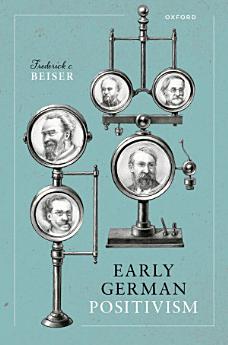Early German Positivism
ɔtb 2024 · Oxford University Press
E-book
240
Pages
family_home
Éligible
info
reportLes notes et avis ne sont pas vérifiés. En savoir plus
À propos de cet e-book
In Early German Positivism, Frederick C. Beiser explores a much neglected or forgotten period of the history of philosophy: the history of German positivism from 1860 to 1907. Almost all studies of positivism revolve around the Vienna Circle. Instead, this study covers positivism even before the first Vienna circle (1907). Beiser delves into figures almost completely forgotten in the German and Anglo-American worlds: Theodor Gomperz (1832-1912), Eugen Dühring (1833-1921), Ernst Laas (1837-1885), and Friedrich Jodl (1849-1914); he also examines Ernst Mach (1838-1916) and Richard Avenarius (1843-1896), who are much better known but contemporaries of these thinkers. Several positivist themes unite these thinkers: rejection of the synthetic a priori; opposition to pessimism; a philosophy of monism, naturalism and historicism; and the belief that the highest good can be achieved only under the guidance of science. Early German Positivism aims to place positivism in a wider intellectual context, which goes back to the Enlightenment and the opposition to the Christian tradition.
À propos de l'auteur
Frederick C. Beiser was born and raised in the USA. He studied in the UK at Oriel College and Wolfson College, Oxford, and then in Germany for many years, receiving stipends from the Fritz Thyssen Stiftung and the Humboldt Stiftung during that time. He has taught in many universities in the USA including Yale, Harvard, Penn, Wisconsin, Colorado, and Indiana. In 2015 President Joachim Gauck awarded him the Bundesverdienstkreuz (the Order of Merit of the Federal Republic of Germany) for his work on German philosophy. Beiser was Professor of Philosphy at Syracuse University for 22 years until he retired in 2022.
Donner une note à cet e-book
Dites-nous ce que vous en pensez.
Informations sur la lecture
Smartphones et tablettes
Installez l'application Google Play Livres pour Android et iPad ou iPhone. Elle se synchronise automatiquement avec votre compte et vous permet de lire des livres en ligne ou hors connexion, où que vous soyez.
Ordinateurs portables et de bureau
Vous pouvez écouter les livres audio achetés sur Google Play à l'aide du navigateur Web de votre ordinateur.
Liseuses et autres appareils
Pour lire sur des appareils e-Ink, comme les liseuses Kobo, vous devez télécharger un fichier et le transférer sur l'appareil en question. Suivez les instructions détaillées du Centre d'aide pour transférer les fichiers sur les liseuses compatibles.







